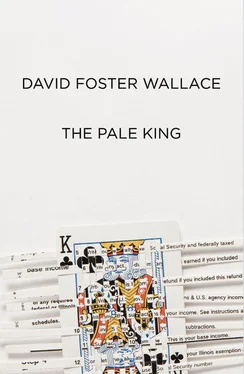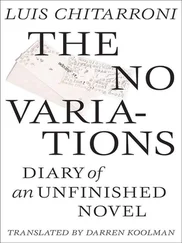‘Do you usually keep hanging out here after the hour and the whole Second-Knuckle crowd leaves?’
Drinion shakes his head. He doesn’t mention the fact that he cannot leave Meibeyer’s until Keith Sabusawa does. Meredith Rand doesn’t know whether he fails to mention this obvious fact because he knows that Meredith already knows it, or whether this guy is so totally literal that what he does is just answer whatever question she asks, literally, like a machine, like with only a yes or a no if it’s a yes-or-no question. She puts out her cigarette in the little yellow foil disposable-type ashtray that you have to request directly from Ron if you want to smoke, because Meibeyer’s has had problems with ashtrays disappearing, hard as that is to really believe given their chintziness. She extinguishes the cigarette a bit more thoroughly and emphatically than she usually does, in order to reinforce a certain tonal impatience in what she says as she puts the cigarette out: ‘All right then.’
Drinion rotates his upper body slightly in his chair to see just where Keith Sabusawa is at the bar. Rand is 90 percent sure that the movement isn’t any sort of performance or anything that is meant to communicate something nonverbally to her. Outside in the sky to the northwest are great sheer walls of rim-lit sunset clouds in whose interior there is sometimes muttering and light. None of the people in Meibeyer’s can see these clouds, although you can always tell physically that rain’s on the way if you pay attention to certain subliminal physical signals like sinuses, bunions, a particular kind of incipient headache, a slight felt change in the quality of the cold of the air-conditioning.
‘So tell me why you think the prettiness thing makes me uncomfortable.’
‘I don’t know for certain. All I could give you is a guess.’
‘You know, you’re not really quite as direct as you seem at first, it turns out.’
Drinion continues to look directly at Meredith Rand but without any sort of challenge or evident agenda. Rand, who is certainly in a position to know that guilelessness can be a form of guile, will tell Beth Rath that it was a little like having a cow or horse look at you: Not only did you not know what they were thinking as they looked at you, or if they were thinking at all — you had no sense of what they were even really seeing as they looked, and yet at the same time you felt yourself truly seen.
‘All right, I’ll play the little game here,’ Meredith Rand says. ‘Do you think I’m pretty?’
‘Yes.’
‘Do you find me attractive?’
‘…’
‘Well, do you?’
‘I find that question confusing. I’ve heard it in movies and read it in books. It’s strangely phrased. There’s something confusing about it. It seems to ask for an objective opinion as to whether the person you’re talking to would describe you as attractive. From the context it usually appears in, though, it seems almost always to be a way of asking whether the person you’re talking to is sexually attracted to you.’
Meredith Rand says: ‘Well, sometimes you have to let a roundabout way of saying things pass, don’t you? Some things can’t be said straight out or it’s just too gross. Can you imagine somebody saying “Are you sexually attracted to me?”’
‘Actually yes, I can.’
‘But it’d be awfully uncomfortable to ask it that way, wouldn’t it?’
‘I can understand how it could be uncomfortable or even unpleasant, especially if the other person wasn’t sexually attracted. I’m fairly sure that packed into the straightforward question is the suggestion that the asker is sexually attracted to the other person and wants to know whether the feeling is reciprocated. So — yes, this means I was wrong. There are questions or assumptions also packed into the underlying question, too. You’re correct — the business of sexual attraction seems to be a subject that it’s not possible to be wholly straightforward in talking about.’
Rand’s expression is now patronizing enough to be irksome or annoying to the vast majority of people she might be speaking with. ‘And why do you think that is?’
Drinion pauses a moment. ‘I think it’s probably because direct sexual rejection is intensely unpleasant for people, and the less directly you express information about your sexual attraction to someone, the less directly you feel rejected if there’s no corresponding expression of attraction.’
‘There’s something kind of tiring about you,’ Rand observes. ‘Talking to you.’
Drinion nods.
‘It’s like you’re both interesting and really boring at the same time.’
‘I’ve certainly been told that people feel I’m boring.’
‘The Mr. Excitement thing.’
‘The nickname is obviously sarcastic.’
‘Have you ever been on a date?’
‘No.’
‘Have you ever asked someone out, or expressed being attracted to somebody?’
‘No.’
‘Don’t you get kind of lonely?’
A small pause for this. ‘I don’t think so.’
‘Do you think you’d know if you did?’
‘I think I would.’
‘Do you know what’s on the jukebox right now?’
‘Yes.’
‘Are you by any chance a homo?’
‘I don’t think so.’
‘You don’t think so?’ Rand says.
‘I don’t think I’m really anything. I don’t think I’ve ever had what you mean by sexual attraction.’
Rand is very good at reading affect on people’s faces, and as far as she can tell there’s nothing here on Drinion’s face to read. ‘Not even when you were a teenager?’
That little pause for scanning again. ‘Not really.’
‘Did you worry you might be a homo?’
‘No.’
‘Did you worry that something was maybe wrong with you?’
‘No.’
‘Did other people worry that something was wrong?’
Another pause, both blank and not. ‘I don’t think so.’
‘Really?’
‘You mean as an adolescent?’
‘Yes.’
‘I think the truth is that no one paid enough attention to me to even wonder what was going on inside me, much less to worry about it.’ He hasn’t moved a bit.
‘Not even your family?’
‘No.’
‘Did that kind of bum you out?’
‘No.’
‘Were you lonely?’
‘No.’
‘Do you ever get lonely?’
Rand has come almost to be able to expect the pause after some questions, or to absorb it as a normal part of Drinion’s conversational rhythm. Drinion doesn’t acknowledge that she has already asked this before.
‘I don’t think so.’
‘Not ever?’
‘I don’t think so.’
‘Why not?’
Drinion takes another sip from his glass of warm beer. There is something about the economy of his movements that Rand enjoys watching without even being quite aware that she enjoys it. ‘I don’t think I know how to answer that,’ the utility examiner says.
‘Well, like when you notice other people having romances or sex lives, and you don’t, or you can tell they feel lonely and you don’t, what do you think about the difference between you and them?’
There is a pause. Drinion says: ‘I think there’s a doubleness about what it is you’re asking. It’s really about comparing. I think it’s more like if I’m watching someone and paying attention to them and thinking about what they’re like, I’m not paying so much attention to myself and what I’m like. So there’s no way to compare.’
‘You don’t ever compare anything to anything?’
Drinion looks at his hand and the glass. ‘I have a hard time paying attention to more than one thing at a time. I think it’s one reason I don’t drive, for instance.’
‘But you know what’s playing on the jukebox.’
Читать дальше












